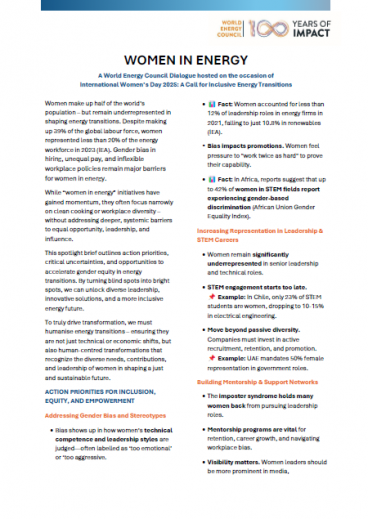Dr. Angela Wilkinson's Address to FOREN 2020
7 September 2020 -- The World Energy Council Secretary General Dr. Angela Wilkinson addressed the Opening Ceremony of FOREN 2020, the World Energy Council Central & Eastern Europe Energy Forum, hosted by the Council's Romanian National Committee. Dr. Wilkinson's full remarks, as prepared for the event, are below.
- - -
Thank you for the invitation to join today’s opening ceremony “Quo Vadis Energy Sector” to address the opportunities, challenges, and perspectives of energy transition in South East Europe. When the original invitation came for this Black Sea Resort Conference I excited to visit in person, but here we are – the world has changed, and we are all learning to adapt to this new normal.
Winston Churchill believed that “South East Europe produces more history than it can consume.” It is hard to disagree with something he never actually said but today we are meeting to discuss how to build a better future of energy for all of humanity – and it will be different to the past.
South East Europe is one of the critical crossroads in connecting diverse energy societies. Regional cooperation is key to realising both national and global visions for better energy futures.
I’d like to thank and congratulate Iulian Iancu and his Romanian Member Committee who have worked hard to enable our whole community and invited guests to meet. I am delighted to see so many of our regional and global corporate partners are supporting this event. This digital gathering marks a new chapter in our ability to convene the whole energy community worldwide.
As Secretary General at the World Energy Council, let me offer some reflections on the current crisis and the challenges ahead to feed-in to your discussions. After all, our role as the ‘how to’ energy community is to inspire, inform and drive to impact.
COVID-19 has dramatically changed our world and shown the importance of energy in our lives. The world stopped, but the lights stayed on! The crisis has impacted all energy firms and all sectors in all regions, but the impacts are highly uneven, and so are the responses.
The World Energy Council is exchanging experiences on impacts, actions and outlooks in over 100 countries – as we have done for nearly 100 years.
Lockdown has brought a massive economic disruption 10 times that of the global financial crisis of 2008. Recovery will trigger the greatest financial capital reallocation in history - hundreds of trillions of dollars are at stake. Rescue and recovery policies by Governments also are still being developed. Our surveys show there are different perspectives on the what the ‘next normal’ will look like, and when.
Despite all these differences, the single most common response is to put people first.
Emerging from crisis and successfully managing global energy transition are not going to be easy. Societies are not aiming to bounce back to before, but to build back better. Crisis has added a new emphasis on resilience - which extends to include people and supply chains, as well as extreme weather and cyber security risks.
To help with the essential job of recovery, our global community rapidly developed a set of four impartial scenarios to 2024 - they are called Rewind, Pause, Fast Forward and Re-Record. Each scenario explores how uncertainties about ambition, trust and ability to control the virus might combine and impact recovery.
We have used these scenarios to build the world’s first Energy Transition Futures Radar. The radar detects real-time signals from across the world and shows how recovery plans are starting to changing the pace and direction of global energy transition.
We are now designing a new investment tool to address the financial capital reallocation opportunity. Innovation and cooperation are still key to success, but not the same as before.
We are now tracking four global drivers of change – decarbonisation, decentralisation, digitalisation and demand-side disruption. To recover and transform we need to promote better cooperation between energy and other sectors. We need to work together to design and deliver more energy and less carbon and build socially sustainable pathways to climate neutrality.
Innovation is not all or only about new energy technologies. Policy choices and behaviour change, finance and business models are combining in a new pattern of collaborative and disruptive innovation. We need to reconnect with the social purpose of energy and plug those impacted by transition into the process. We cannot neglect the pull of new and shifting energy demand or issues of societal affordability and justice.
Our call to action? It takes a community movement to build and change a whole energy system. It’s great to see that the FOREN agenda reflects this open-future mindset and whole system community principles.
Our community-wide drive to inspire, inform and impact is now focussed on three key imperatives:
- Humanising energy transition
- Maintaining an open energy future
- Building the world’s first energy plus community
Our pragmatic, whole system approach is essential to overcome the fragmentation and extreme polarisation in energy transition leadership. Our distinctive vision of humanising energy transition is key to responsible and transformational recovery. Our practical tools are designed to keep the future of energy open to new and better possibilities.
Energy transition pathways are bridges to a better future for all of humanity. The future is open to many and more diverse solutions for green, clean and sustainable, as well as reliable and affordable, energy.
I invite you to all – member community, corporate partners and honoured guests – to join us in discussing these three challenges. Only by working together and humanising energy transition can we keep the future of energy open and inspire new possibilities for humanity.
I shall be looking closely at the outputs from this important virtual gathering and look forward to liaising with the Romanian National Committee and Ministers on how we can best take these forward.






_-80_result_688_387_s_c1_c_c.jpg)

